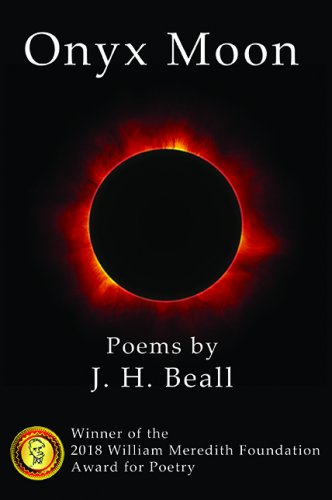
About the Author
Jim Beall is an astrophysicist, a poet, and an author on issues related to public policy and national defense. He holds the degrees of B.A., M.S., and Ph.D, all in physics. He is a member of the faculty at St. John’s College in Annapolis, Maryland, and a senior consultant to the U.S. Government. His first book, Hickey, the Days, was published in 1981 by the Word Works, Inc., and his second book, Republic, was published by Toad Hall Press in 2010. The Italian translation, Repubblica, translated by Sabine Pascarelli, was published by Toad Hall Press in 2013. Onyx Moon is his third book.
Photos by t. s. Beall, a new-media artist based in Glasgow, UK, whose work explores how the camera and digital media have shifted our notions of place, and how landscape is both imaged and imagined by modern technology. She completed her Ph.D. at the University of Glasgow in 2017.
ONYX MOON: Poems
J. H. BeallScarith, 2018
84 Pages, 6 Photos
ISBN 978-0-9995572-2-8 Paperback Color
For BULK ORDERS, order directly from New Academia Publishing.
Queries: orders@newacademia.com
About the Author
Jim Beall is an astrophysicist, a poet, and an author on issues related to public policy and national defense. He holds the degrees of B.A., M.S., and Ph.D, all in physics. He is a member of the faculty at St. John’s College in Annapolis, Maryland, and a senior consultant to the U.S. Government. His first book, Hickey, the Days, was published in 1981 by the Word Works, Inc., and his second book, Republic, was published by Toad Hall Press in 2010. The Italian translation, Repubblica, translated by Sabine Pascarelli, was published by Toad Hall Press in 2013. Onyx Moon is his third book.
Photos by t. s. Beall, a new-media artist based in Glasgow, UK, whose work explores how the camera and digital media have shifted our notions of place, and how landscape is both imaged and imagined by modern technology. She completed her Ph.D. at the University of Glasgow in 2017.
About the book
Onyx Moon is the recipient of the 2018 William Meredith Foundation Award for Poetry. The Foundation was established in memory of poet William Meredith. As part of his long and distinguished career, from 1978 to 1980 Meredith was Consultant in Poetry to the Library of Congress, the position which in 1985 became the post of Poet Laureate of the United States of America.
Praise
“In Onyx Moon, the poems of Jim Beall ask ‘that the night / will bring stars out of the darkness.’ Dark and light move hand-in-hand through these solid, compact poems. The light is ‘as fine…as Lucifer’s longing,’ exposing ‘the nakedness of bone.’ The dark is both our own and the cosmos itself: ‘caused by the flinging away of remotest parts.’ If anyone can hear the music of the spheres while staying true to contemporary science and all the progress that poetry has made in the last century, it is Beall. In his work, poetic and scientific inquiries become one, ‘a pilgrimage…a choice, a trajectory…so like a pinnacle or a precipice in the high thin air.…’ His language fires that music which has us remembering first love and flying past far galaxies in the same breath. Listen: what the heart craves, what the universe says, ‘the color of lost memories,’ and ‘the fiddler in the hall’: this skilled and patient poet brings us all of these and shows us their ‘convergence of tracks, dark rails shining, seeming to have their own light.’
In this teetering era, when we worry, ‘What if the world be gone / before you are but memory?’ Beall brings us back to the human soul, dares to believe it, while never losing his utter conviction that science is God, God is poetry, and poetry is the long-lost lover the scientist must reclaim.”
—Nancy White, author of Sun, Moon, Salt, and Ask Again Later.
“In this time of twitter, electronics, cyber worlds, and Netflix, how beautiful to be reminded once again that language can be elevated to the lyricism of the classics, and pierced with the relevance of the modernists. We might call Beall’s poetry wakeful dreaming were it not for the need to craft it to a pattern of certainty. Form is the way we hold our art and James H. Beall has a knowledge of form and the gift of insight. Every single poem in Onyx Moon is a transitional state where meaning is unfolded. Keep an eye on Beall’s visualizations that focus clarity within the lines. Once you begin reading, there’s no going back. We’re led through a passageway of sentient experiences where the imagination of the poet meets our own emotional realities. Beall’s poems are golden daydreams that tell us more about being fully alive. He’s a classical scholar and an astrophysicist who brings scientific and literary knowledge to fulfill beauty’s purpose.”
—Grace Cavalieri, producer, “The Poet and the Poem from the Library of Congress.”





 Coming Soon
Coming Soon Awards
Awards